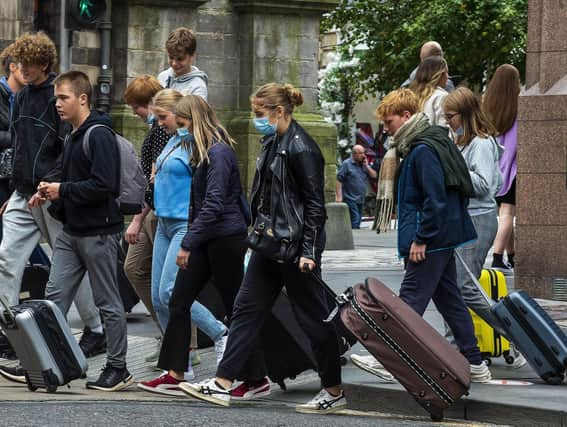Scottish cities see hotel markets slump due to pandemic


However, PwC’s UK Hotels Forecast 2020/21 has forecast improving fortunes next year for the three cities due to increased demand for staycations across the UK outside London. The accountancy giant also believes there is plenty hotels can do to “put themselves on the right path”.
According to the report, the cost of an overnight stay in Scotland’s capital has fallen by a third to £70.36, and Edinburgh remained the third-most-expensive UK city in which to spend the night, behind London and Brighton.
Advertisement
Hide AdAdvertisement
Hide AdPwC said the cancellation of the Edinburgh Festival was a contributing factor in the 63 per cent decline in the key industry metric of revenue per available room (revpar), the sharpest fall in any of the 24 UK cities measured. It fell from £77.37 in July 2019 to £28.32 12 months later, largely as a result of occupancy halving to 40 per cent.
In Glasgow, revpar more than halved to £24.29 as occupancy dropped to just under a quarter. The average daily rate (ADR) for a stay in Scotland’s largest city fell by nearly a fifth to £58.57.
The picture was similar in Aberdeen, where occupancy was 44.1 per cent, down from 65.5 per cent the previous year. The Granite City, which had been recovering from a regional economic downturn, saw revpar remain pretty much flat at £54.99.
Looking at the UK as a whole, PwC said that in the bleakest outlook since benchmarking began in the 1970s, hotel occupancy rates in 2021 are forecast to be 55 per cent nationwide, increasing from 42.2 per cent in the year to July 2020. The study reports that it could take four years to return to pre-pandemic levels and much of the ongoing decline will affect London.
Claire Reid, regional market leader for PwC in Scotland, commented: “The hotel sector, like the entire hospitality industry across Scotland, has been more heavily impacted than most by the economic impact of the pandemic, and while the road to recovery is unlikely to be smooth, there are actions that hoteliers, and those who invest in the industry, can take to put themselves on the right path. Through focusing on operations, liquidity and cash, hotels can help mitigate the uncertainty of the market.
“We’ve seen how quickly hotels adapted to our new way of living when they reopened in the summer, and there is a fresh impetus now for digital transformation. A number of hotels have been deploying more contactless technology, digital check-in, and digital room keys, as well as in-room voice devices and digital concierges.”
Kevin Reynard, senior partner for PwC in Aberdeen, also said: “The city’s hotels had shown strong signs of recovery last year and I am confident that the sector will recover again ... like the rest of the country, we do not expect business travel to return to pre-Covid levels quickly – although Aberdeen has great potential as a hub for tourists looking to explore the north-east of Scotland, especially while international travel becomes increasingly difficult.”
A message from the Editor:
Thank you for reading this article. We're more reliant on your support than ever as the shift in consumer habits brought about by Coronavirus impacts our advertisers.
If you haven't already, please consider supporting our trusted, fact-checked journalism by taking out a digital subscription.
Comments
Want to join the conversation? Please or to comment on this article.